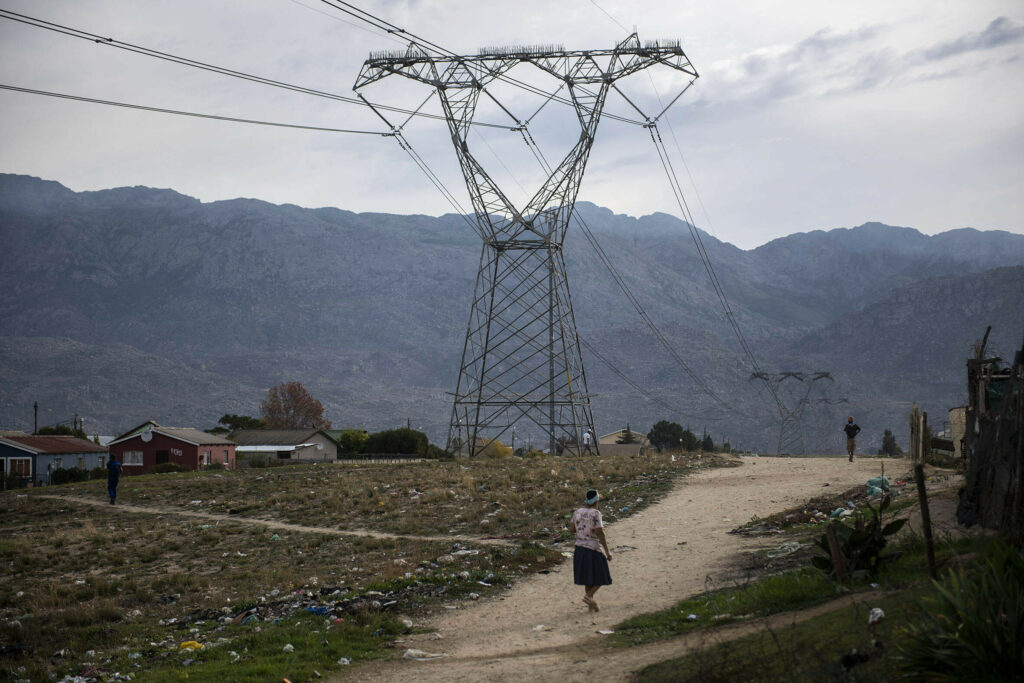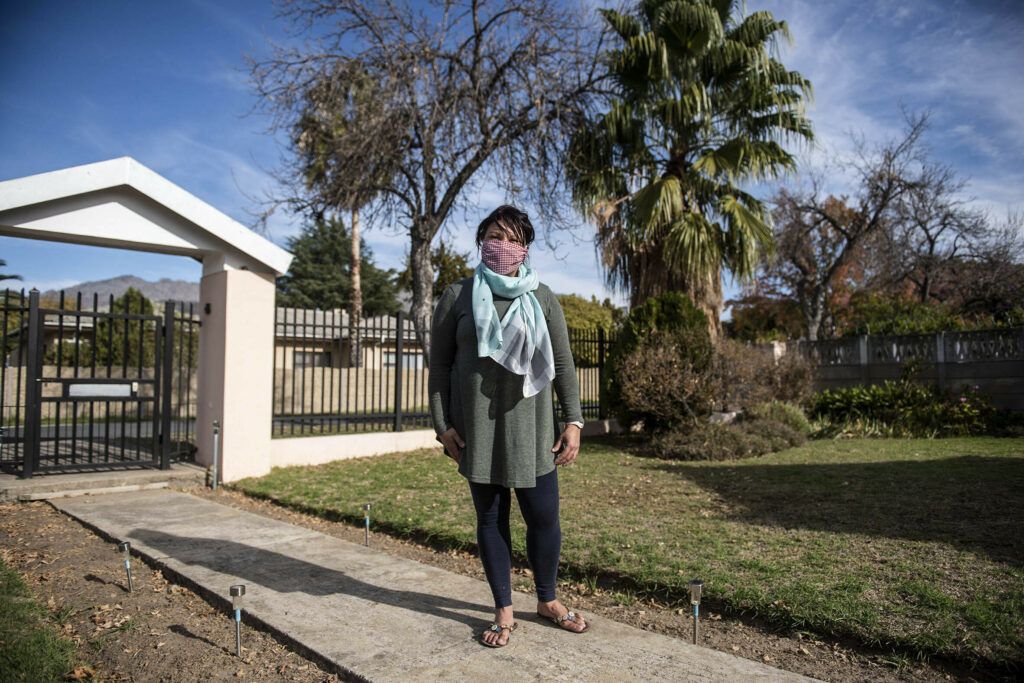Food for thought: A Covid-19 quarantine area has been established for farm workers. (David Harrison)
If ever a place lived up to its name it’s Ceres in the Western Cape. Ceres is the Roman goddess of agriculture and fertility and showed people how to grow grain and so prevented famine.
The Ceres area, which includes Tulbagh, Wolseley and Prince Alfred Hamlet, is renowned for its orchards and most of its A-grade produce is exported. Other products include vegetables, grapes, grain, olives and livestock. In winter, snow falls on the mountains above the Ceres Valley. When it thaws, rivulets refill rivers and replenish underground aquifers feeding the fertile soil.
But it’s these orchids, agri-processing factories and packhouses that have become a transmission hotspot for the coronavirus in Ceres and the Witzenberg local municipality, a long area stretching from the Cederberg mountains in the north to the Ceres Valley in the south.
Outside of Cape Town, the municipality has the highest number of cases of Covid-19 in the Western Cape — 211 as of Wednesday night.
 The Witzenberg local municipality, which, at 211, has the second-highest number of cases in the Western Cape. (David Harrison)
The Witzenberg local municipality, which, at 211, has the second-highest number of cases in the Western Cape. (David Harrison)
The agriculture sector is deemed an essential sector and continued operating after the lockdown was first introduced.
Early on in the outbreak, the Western Cape government identified the Witzenberg municipality as a hotspot. Health authorities said they had immediately taken action, screening and testing as many people as possible, which resulted in revealing a higher rate of positive cases.
Naomi Betana, a community worker at the Witzenberg Development Centre, said farm and agriculture workers face exposure to the virus on multiple fronts, including travelling to work and at the packhouses and factories.
 Witzenberg municipality community worker Naomi Betana warns that the virus will spread in dense settlements. (David Harrison)
Witzenberg municipality community worker Naomi Betana warns that the virus will spread in dense settlements. (David Harrison)
“Those infections are among workers and are internal transmissions now,” she said. “We are not entirely sure which areas exactly. But we’ve had some factories that were shut down temporarily.”
She said not only are workers at risk at factories but there is also the risk of spreading the virus in the densely populated areas where they live, which offer little opportunity for people to practise physical distancing. It’s a housing problem built on the legacy of apartheid spatial planning, and the failure of current administrations to meet housing needs.
“Most of our factory workers live in condensed residential areas. So the person will come home and there’s about six or seven people in the house. In the backyard, there will be backyard dwellers,” Betana said, adding that one worker who tested positive went home to 13 people. “It is shocking. She wasn’t immediately transferred by the health department to the quarantine site. We had to make calls to get her transported to that site.”
Betana believes the government is failing to meet track-and-trace targets of people who have tested positive. She said that it’s pointless to screen people who may be asymptomatic, which means they could spread the virus where they live. This is disputed by provincial health authorities.
Betana is now part of a call for a total shutdown of the municipality and its industries to curb the spread of the virus. It would mean the agriculture sector would grind to a halt, costing jobs and affecting fruit processing for the domestic and international market.
“I don’t think people must be given the choice of choosing between their health and their livelihoods. Of course, people will choose to earn an income. But why do we force people to make those decisions? It’s especially unfair in a rural area,” she said.
“If Witzenberg is an epicentre here, why are we moving to level three when it gives people more movement and a chance for the virus to spread?”
As the numbers of Covid-19 cases creep higher, the silence of stigma grows louder. People say there is a feeling of embarrassment if you or someone in your family is tested positive.
What’s worse, is that testing positive would mean they’ll be in isolation for at least two weeks. Workers fear it is a fortnight without an income for their family.
“Stigma is rife here. The people who have been tested positive, they don’t want people to know,” said Katinka Koopman of the Ceres Water Justice Coalition.
 Ceres Water Justice Coalition member Katinka Koopman warns of the psychological toll on workers (David Harrison)
Ceres Water Justice Coalition member Katinka Koopman warns of the psychological toll on workers (David Harrison)
“Because you can’t see the virus you don’t know who has the virus. People don’t want people to know someone in their family is sick. It’s problematic. Because if we knew who is positive, people could come forward and say, ‘I was in contact with him, or her,’ and then we can get more people isolated and treated.
“Some people in our community have put videos on Facebook to say they have the coronavirus, and I think that’s a good thing.”
The shame of being tested positive and the fear of becoming infected is taking a toll on workers. Betana and Koopman speak of the psychological toll of the outbreak particularly among working-class people.
“People are working in fear. They want to work, have to work. But they also have to think about their health and safety. People who have to go into isolation because they’re awaiting tests don’t get paid,” Koopman said.
But it’s unclear whether lockdown regulations have done much to the spread of the disease in Ceres. Many in the town say younger people do little to socially distance themselves from one another.
Koopman said: “The older people are really scared. You can hear it when they talk. But younger people aren’t taking this thing seriously. Here it looks like a perfectly normal day like it’s no lockdown. The people who work, they don’t want to go because they’re afraid. But they need to earn money.”
The provincial government has confirmed a large number of positive cases have arisen from the agriculture sector. Local organisations say they worry that packhouses will continue to be the epicentres of infection in the municipality.
“I know of people who would come back from work every day and say another person was sent home with coronavirus. They need to close these packhouses for a month. And then we’ll see where most of the infections are,” Koopman said.
But closing the orchards and packhouses for a month would cost wages. As an essential sector, agriculture has continued to contribute to the public purse in tax revenue and keeping the local economy ticking over.
Workers say it’s because of this that so many of them have been exposed to Covid-19.
One worker, who did not want to give their name or that of the company they work for, said agricultural companies owe it to workers to support them during this time.
“Closing the factory and still paying the workers is the least that farmers can do for people who have worked for them for years. Even if it’s just R500 per worker. No one asked for this [pandemic], especially not workers,” said the worker.
One of the larger fruit processing companies in the area, the Rhodes Fruit Group (RFG), said it has been affected by the coronavirus outbreak.
In a statement last week, the company confirmed it was closed for up to four days for deep cleaning and decontamination its work environment after nine workers had tested positive over the past few weeks — with the department of labour ordering it to further decontaminate.
The company then announced it was embarking on a phased reopening of operations after meeting compliance guidelines. In a statement the chief executive, Bruce Henderson, said: “While the closure has been disruptive to our canning process and we have a national imperative to supply food products during the lockdown, we cannot and will not compromise the safety of our employees.”
In a later statement, Rhodes Fruit Group said it was prioritising the safety of workers with increased physical distancing measures, staggered shifts and the procurement of personal protective equipment.
It also announced a financial relief assistance fund for workers affected by Covid-19. Contributions to the fund come from Henderson taking a 50% pay cut while other executives will take a 30% pay cut over the next three months.
“The employee assistance fund will ensure that employees continue to be remunerated, regardless of whether they may be required to work reduced hours due to the lockdown. The fund is evidence of the commitment of RFG executives and non-executives to ensure that employees and their families are supported in this time of crisis,” the company said.
Rhodes Fruit Group said it would also assist seasonal workers with applications to the Unemployment Insurance Fund and the Temporary Employer-Employee Relief Scheme.
The Western Cape government said it is not only working hard to respond to the outbreak in the Witzenberg but also to improve living conditions to bring more comfort to vulnerable people. This week Premier Alan Winde announced 229 new houses have been built in Ceres. “Our government is continuing to work hard throughout this pandemic to continue to deliver on its mandate, and I am excited that these residents will soon move into their new homes. Improving the lives of vulnerable communities is our top priority and a critical part of the response to the pandemic,” said Winde.
The provincial government has also incorporated several interventions in the region, including the completion of a temporary testing and triage centre at the Ceres Hospital.
He added: “This is one of 18 such facilities across the province, which helps to relieve the pressure on hospitals’ emergency services, while also allowing space for residents to be triaged and tested separately from the other hospital services.
“The ability to test and immediately isolate positive cases is key in helping to flatten the curve and prevent new infections. The testing and triage centre bolsters the testing response in the region.”